Hi everyone! Just a note to say: spoilers ahead!
In 2022, I left the cinema dumfounded by Olivia Wilde’s Don’t Worry Darling.
Despite all the alleged star-studded drama which had unfolded in the lead up to the sci-fi thriller’s release, I still held out hope that the film would live up to its promising trailer. The dream-like cinematography, a mystery element, the stunning set and costume design—it seemed to present all the ingredients for everything that gets me excited.
Not to mention, as a huge Florence Pugh fan, I was hyped. But her fantastic performance was soon eclipsed by the confusing (yet, somehow, simultaneously underwhelming) plot (plus its many holes) and other poor casting choices.
If you haven’t seen it yet: Don’t Worry Darling was a huge disappointment. A car crash, to be honest.
The worst part is, the film had so much potential. I was thinking about the dangers of incel (involuntary celibate) culture for days after.
“You know the incels? […] They’re basically disenfranchised, mostly white men, who believe they are entitled to sex from women. […] And they believe that society has now robbed them—that the idea of feminism is working against nature, and that we must be put back into the correct place.”
To summarise: Alice and her husband live happily in a 1950s-esque commune deep in the desert. They’re deeply in love. She waves him off to work in the morning, blissfully spending her days cooking, cleaning and socialising. But something feels off. Alice slowly realises that all her friends are living the same life—shared meet-cute stories and honeymoon destinations—and, more startlingly, cant remember anything prior to their current lives.
Over a series of flashbacks and recovered memories, Alice works out she’s living in a simulation. Once she breaks free, she remembers that she is a surgeon, and her boyfriend is not the British sweetheart she thought, but an unemployed incel who never washes his hair and complains about their sex life. He had trapped her in this simulation to remove all of her successes and distractions so he could feel important again.

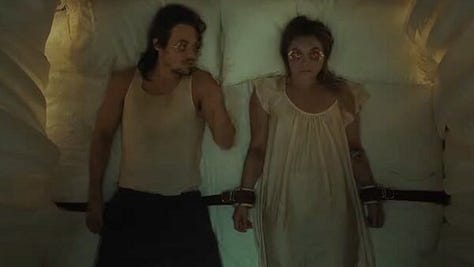
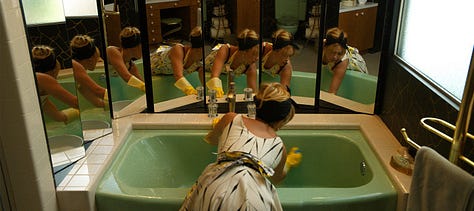
Disregarding its poor execution, the concept is genius.
The threat of incel culture and technology is not only terrifying but hauntingly relevant: popular incel forums receive an average of 2.6 million visits a month, with a 59% increase of violent language. Andrew Tate and Jordan Peterson are household names and radicalising young boys.
And so art keeps talking about it.
Fast forward to 2025, and I (again) had high expectations for (another) sci-fi thriller: Companion.
Except this time, I was delighted.
The feminist slasher horror starring Sophie Thatcher (Iris) and Jack Quaid (Josh), plays out in a world where mobile-controlled humanoid robotic ‘companions’ can be bought and used to their owner’s pleasure. Companions—programmed to be in love with their user—can feel pain, human emotion, have past memories, and don’t know they are inhuman.
Josh and his Companion girlfriend, Iris, attend a friendly gathering in a remote mansion in the woods. But the trip turns into a nightmare as Josh orchestrates the murder of the loaded home-owner Sergei (Rupert Friend) using Iris as the scapegoat.
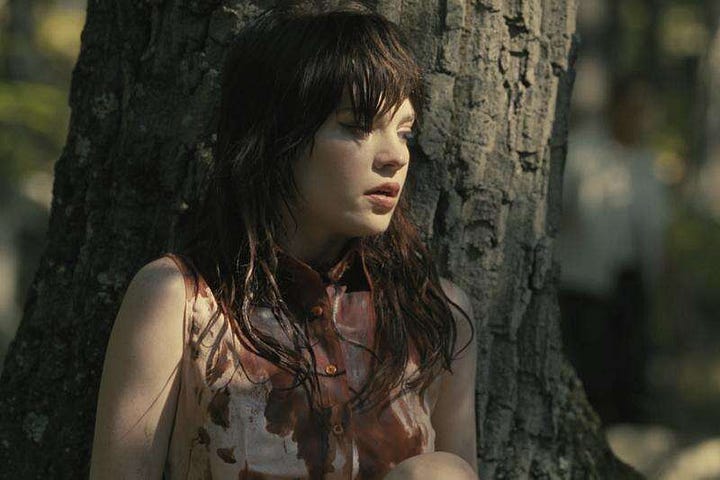
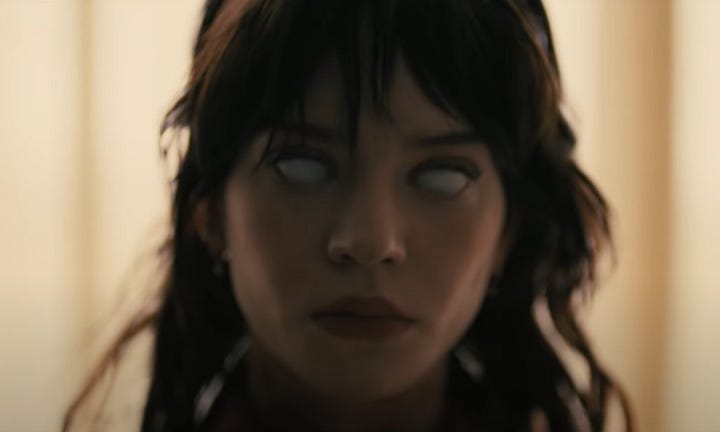
It’s made clear (to the audience) from the get-go that Iris is non-human. In a series of unsettling interactions, she is treated differently by her human friends, and even told ‘this is what you are for’ when sexually harassed by her host.
The shock-factor is in the cruel revelation that she is unaware of her programming.
This is no Subservience, where Megan Fox (Alice) knows she is a maid-bot designed to wait on hand and foot. Iris believes she is human, and that her love is mutual.
Thus, understandably, her world completely collapses when Josh cruelly reveals the truth: from her intelligence level to her eye colour, everything about her is designed to fit his fantasy.
It comes to no surprise, then, that Josh is an incel.
In a horrific denouement, he admits to feeling he’s a ‘good guy’ who isn’t living the life he ‘deserves’. He is an average tax-paying dude, yet he lives in a cramped one bedroom apartment and can’t get a girlfriend. He despairs he can’t even afford to ‘own’ Iris—she’s a rental.

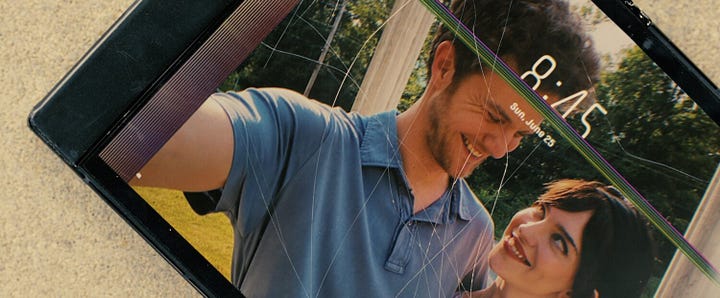
Despite his hunger for control and misdirected anger, under different circumstances, maybe Josh wouldn’t have ended up as an incel. But the existence of Companions offers an all-too-easy, all-too-available, ‘solution’ to his loneliness.
Why be nice to women, when you can just buy one?
This ideology seems adjacent to the incel idea that women intrinsically owe men something. The film’s narrative structure and horror elements—psychological dread, claustrophobic settings, unsettling imagery— amplify the sense of alienation and the fear that arises from the subculture's entrapment in a cycle of bitterness and violence.
Jack Quaid plays the perfect villain. And its not his first rodeo: in Scream (2022) his nice-guy persona covered for his crimes. Sophie Thatcher is also brilliant.
It’s hard to pull this story off. But Companion was self-aware, on-the-nose, and comedic enough to navigate the terrors of its dystopian reality; Instead of trying too hard to make a political statement about incel culture, Companion absorbs the concept into the horror genre until the dangers speak for themselves.
As always, thanks for reading!
My previous post:


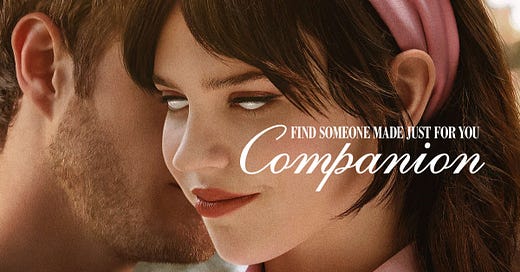


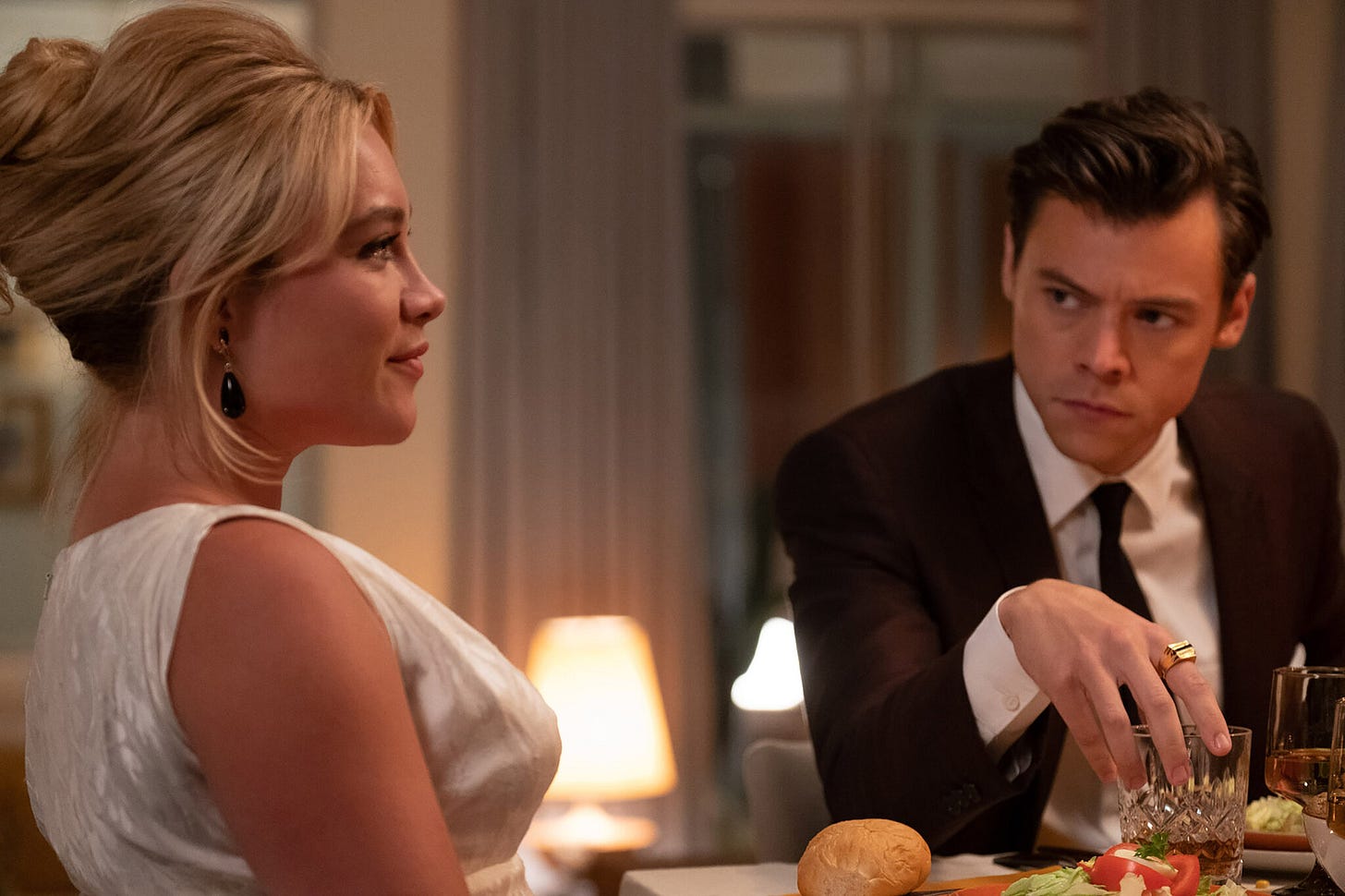




I wasn't convinced on Companion and have put off watching it--but you've convinced me!
I also LOVED the way you structured this piece! I've never associated Don't Worry Darling with incel culture since it was in and out of mainstream consciousness before incel culture truly broke into mainstream algorithms. But it makes total sense! You're right!
Can't wait to see (and read!) what you post next! 💫
p.s. do you have letterboxd?